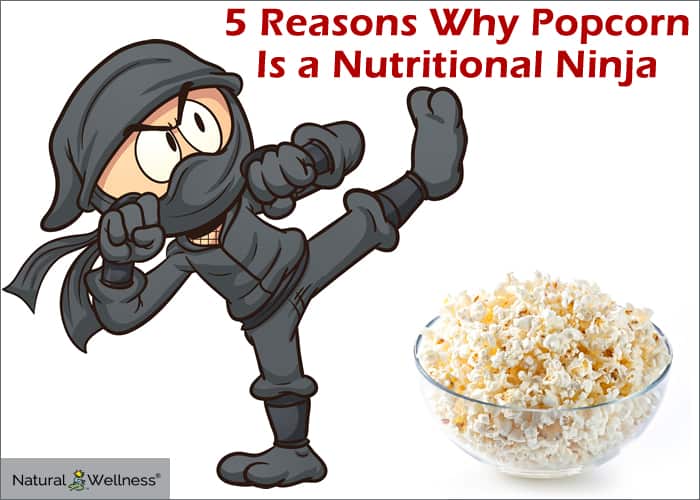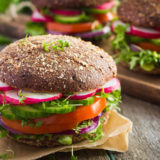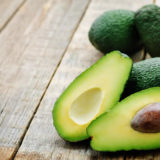

It’s been a popular snack food on this continent for over 2,000 years, first in the southwest and now popping in every movie theater around the world. In all that time, the basic ingredient has changed relatively little. Popcorn is now, as it was then, a delicious and surprisingly healthy treat. Of course, that depends on what you put on it! Slather it with processed butter and other unnatural chemicals and its nutritional content will be drowned.
Today, we’ll teach you how to get out from under that unnecessary gunk and give you the straight story on popcorn.
5 Health Benefits to Snacking on Popcorn
1. Popcorn Is GMO-Free
Corn is big business in America. A top export and the primary ingredient in all sorts of byproducts (including cornmeal, flour and sweeteners), almost 90% of U.S. corn is genetically modified in some way. But not popcorn.
That’s because popcorn comes from a different kind of seed than sweet corn and feed corn. These latter two seeds are bred for thin outer shells and juicy inner starches. Popcorn seeds, on the other hand, were bred over centuries to pack more starch inside the kernel to keep its inner layer protected from heat and moisture. The hard shell plus the extra starch is what causes the kernels to pop when exposed to heat. Because of their softer shells, sweet and feed varieties are impossible to pop.
So don’t be fooled by popcorn boxes that advertise themselves as GMO-free. It’s a great advertising gimmick for brands that want to appear more natural than their competition, but it’s literally impossible for popcorn to be grown another way.
Unfortunately, the conventional soybean oil that’s used to cook popcorn in most movie theaters? There’s a 95% chance it’s GMO. And that artificial butter flavoring we all love? It can contain diacetyl, a chemical compound that’s been shown to damage the lungs of certain animals and may contribute to beta-amyloid buildup on brain cells, a potential precursor to Alzheimer’s and dementia. That’s why the healthiest popcorn is always the kind you make for yourself.
2. Popcorn Is a Great Source of Fiber and Antioxidants
Dr. Joe Vinson is a professor of chemistry at the University of Scranton and an expert in analyzing the healthier aspects of common foods like chocolate, nuts, and popcorn. According to Vinson, “Popcorn has more antioxidants in total than other snack foods that you can consume and it also has quite a bit of fiber.”
In a 2012 American Chemical Society presentation, Vinson showed that popcorn actually contains more antioxidant polyphenols than many fruits (300 mg per serving compared to an average 160 mg). Polyphenols are a type of plant chemical that help neutralize free radicals that damage cells and contribute to aging.
Vinson singled out the popcorn hulls that often get caught in your teeth. “Those hulls deserve more respect. They are nutritional gold nuggets.”
Moreover, Vinson believes that popcorn may be the perfect snack food. “It’s the only snack that is 100 percent unprocessed whole grain. All other grains are processed and diluted with other ingredients, and although cereals are called ‘whole grain,’ this simply means that over 51 percent of the weight of the product is whole grain. One serving of popcorn will provide more than 70 percent of the daily intake of whole grain.”
Why is whole grain important? Well…
3. Popcorn Can Clean Your Arteries
Whole grain is a very special kind of fiber that strips excess cholesterol from the walls of your blood vessels and arteries. We don’t have to tell you that’s a pretty big deal!
According to the U.S. Department of Agriculture, popcorn is the fourth most-consumed whole grain in the U.S., after whole wheat, whole oats, and whole grain corn. It’s recommended that at least half of your six daily servings of grains should come from whole grains. And guess what? Popcorn eaters get twice as many whole grains and over 22% more fiber than non-popcorn eaters.
Eating whole grains reduces your cholesterol and improves your cardiovascular health by reducing the chance of atherosclerosis, heart attacks, and strokes.
4. Popcorn Helps Your Bones, Skin, and Blood Sugar
Forget the butter and any fancy toppings. By itself, popcorn is loaded with important nutrients. A 3.5 ounce serving of popcorn provides more than half your recommended dose of manganese, which supports healthy bones and skin. It also provides significant servings of magnesium and phosphorous, another mineral that supports healthy bones and cell function. And you also get not insignificant amounts of zinc, copper, Vitamin B3, Vitamin B6, and potassium. Together, these nutrients regulate blood sugar and help to prevent cancer.
5. Popcorn Can Be Enjoyed Without Extra Chemicals
You’re not going to find the healthiest popcorn in a microwave. Yes, it’s convenient, but the lining of the popcorn bag contains perfluorooctanoic acid (PFOA), a class of compounds that may be linked to infertility, low birth weight, thyroid disease, and ADHD in children. In animal tests, PFOA was also linked to liver cancer, testicular cancer, and pancreatic cancer.
Microwave popcorn also packs twice as many calories as the air popped version. “Air-popped popcorn has the lowest number of calories,” Dr. Vinson says. “Microwave popcorn has twice as many calories as air-popped, and if you pop your own with oil, this has twice as many calories as air-popped popcorn. About 43 percent of microwave popcorn is fat, compared to 28 percent if you pop the corn in oil yourself.”
Organic kernels are relatively inexpensive, and the toppings are up to you. Air-popping your popcorn is the healthiest option, but if you prefer to use the stove, try coconut oil. Another scrumptious alternative is ghee, or clarified butter. After you’ve popped your kernels, use sea salt to flavor it. Yeast powder is also a great way to add some B vitamins. Pair that with a superfood protein shake and you can enjoy a healthy, fulfilling meal!




